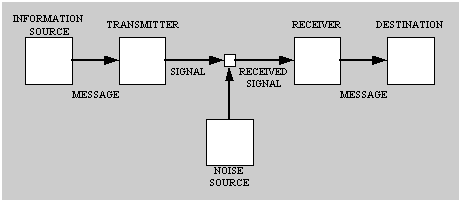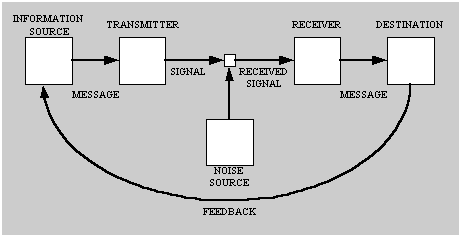Jessica Vanacore
Hi class,
I found John M. Phelan's definition and explaination of cyberspace really beneficial in understanding some of the basic concepts we have been discussing. Phelan notes that cyberspace “is people controlling devices through computers that give them the feeling of feedback as if the devices were parts of their own bodies” (48). I want to connect this notion of feedback in cyberspace with Shannon and Weaver’s model of communication. Shannon and Weaver’s model was the first representational of a general model of communication based on their work at Bell Atlantic. It was based on the telephone system of a sender, message, and receiver. Here, you can view the general model.
 After reading Phelan, looking back on this model and the concepts associated with it helped me understand his definition and context of “cyberspace.”
After reading Phelan, looking back on this model and the concepts associated with it helped me understand his definition and context of “cyberspace.”Norbert Weiner later elaborated on Shannon and Weaver’s model, just adding one key factor: the cybernetic concept of feedback. Feedback allows the sender to modify their messages based on the feedback of the receiver. In cyberspace, Phelan writes that “projection of our own body parts into inanimate tools and devices is an essential human experience of feedback because our senses always strive to be transparent” (48).
 Feedback allows for there to be more transparency in the medium, the immediacy that communication demands. The user of the computer is now demanding faster feedback in order for the communication process to flow almost naturally. We are projecting ourselves onto the medium and with technology, as Phelan writes, “enable us to experience control as a projection of the self out of our center, from our wills, into something else” (49). Same as in human communication, feedback shapes the messages that are sent and received between the information source and the destination. The fact that the computer and internet is interactive allows feedback to become a crucial aspect in its success, and possible why the internet is referring back to a many to many form of communication. The popularity of social networking is based on interactive feedback. The computer, or internet, is just a tool that humans project themselves onto for communication.
Feedback allows for there to be more transparency in the medium, the immediacy that communication demands. The user of the computer is now demanding faster feedback in order for the communication process to flow almost naturally. We are projecting ourselves onto the medium and with technology, as Phelan writes, “enable us to experience control as a projection of the self out of our center, from our wills, into something else” (49). Same as in human communication, feedback shapes the messages that are sent and received between the information source and the destination. The fact that the computer and internet is interactive allows feedback to become a crucial aspect in its success, and possible why the internet is referring back to a many to many form of communication. The popularity of social networking is based on interactive feedback. The computer, or internet, is just a tool that humans project themselves onto for communication.Phelan uses this idea of feedback to discuss the popularity of the need for communicating via the internet. He discusses in CYBERCELLS the fact that people sit in front of computer screens all day, and with an interface that allows for multiple windows to be open, people want to look through one and have someone wave back (52). He calls this cybertalk in cyberspace, and that people gravitate towards this for response when they are usually lonely. But it is important to note that cyberspace is not a replacement for “guided linear thinking, friendship, travel, or learning” (54). Cyberspace cannot replace life, but should be a place to go to for information and it is “not a world of primary experience” (54).
But with instantaneous (or near so) feedback on the web that helps aid communication to the point where people are going onto the internet, or looking through different windows, to escape daily life- isn’t there a threat that this medium will become a primary source of communication, let alone dissemination of information? Just the simple idea that Phelan discusses of the lonely office worker going onto the internet for some sort of feedback, to escape, or project, into cyberspace, is a threat to today’s society. Between gaming systems, Facebook, twitter, and real time feedback whether it’s TV programming or the news, I think society is opening more and more windows. Cell phones allow you now to do this at any second, any time of the day. Are these windows ever going to be closed?
Honestly, I think a healthy balance will be achieved for some individuals, but not for others. But there is also this other aspect of the need for cyberspace. Whether it’s a personal need, work related need, or school need. It’s really not becoming an option anymore to close a window when you’d like to, and that is what I feel will be the hardest balance to achieve. How much of a person’s life is going to be spent in cyberspace out of choice, rather than need? If I didn’t have a cell phone linking my email, I would not be able to function because I am always away from a computer. But I still need to check my email, and need to respond to people. Where is my will? It’s not that I need to, but I have to. Cyberspace commands me! If not people would assume I am either dead, or not doing my job. I feel this way with text messaging as well. Sometimes I just want to turn the phone off but if I do, or ignore the messages, people become upset because I am giving them no feedback. I am being relied on to send a message back so someone else so they are being supplied with information, even if it’s not new. I am just concerned with the future of our choice of the depth of our interaction with cyberspace.
-Jessica Vanacore



No way to close the feedback loop, is there? I like the way you brought Shannon-Weaver into this, and I resized the images to make them fit the blog better.
ReplyDelete